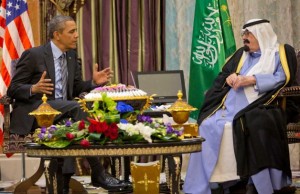Special to WorldTribune.com
WASHINGTON — President Barack Obama has dismissed the prospect of a breakthrough with Saudi Arabia. Officials said Obama would visit Saudi Arabia on the night of March 28.
The officials said the president cut short his visit to Riyad after King Abdullah rejected Obama’s request to convene a Gulf Cooperation Council summit to mediate the dispute between Saudi Arabia and Qatar.

“The situation between and among the members of the GCC has grown more complex of late,” National Security Advisor Susan Rice said. “And while we maintain very strong and cooperative relationships with each of the GCC countries, we didn’t think that from their point of view that the time was optimal for a collective meeting.”
As a result, Obama’s visit to Saudi Arabia, touted for months as an opportunity to revive the relationship between Riyad and Washington, would be limited to a meeting with Abdullah. Officials acknowledged that the president’s session with the king, estimated to be nearly 100-years-old, would be probably brief and concentrate on Iran and Syria.
“It could be a diplomatic disaster,” Simon Henderson, a leading U.S. analyst on the Gulf, said.
Henderson, a senior fellow at the Washington Institute for Near East
Policy, said the Saudi king tires easily and could not sit for much more
than an hour. He said Abdullah’s last meeting with U.S. Secretary of State
John Kerry in October 2013 failed.
“A two-hour meeting with Secretary of State John Kerry in October, after
the breakthrough in nuclear diplomacy with Iran, apparently did not get
beyond the shouting stage,” Henderson said on March 27.
Officials said the president sought to prepare his visit by holding
meetings with several second-generation princes, including Interior Minister
Prince Mohammed Bin Nayef and Deputy Defense Minister Prince Salman Bin
Sultan. Obama also sought to send messages to the Saudi king through United
Arab Emirates deputy military commander Gen. Mohammed Bin Zayed Al Nayhan.
“It was also an opportunity for the president, on the eve of his travels
to the Gulf, to hear directly from a valued partner of the United States
about the situation there and to have the opportunity to share perspectives
on what would be the most fruitful in terms of his visit down in Saudi
Arabia,” a senior administration official said.
But officials acknowledged that most of the preparations were marred by
a failure to bridge gaps between Riyad and Washington on key issues,
including Iran, Syria, Egypt as well as
human rights. Riyad has already refused to allow a correspondent of an
Israeli newspaper, Jerusalem Post, to accompany Obama.
“Look, we have disagreements with Saudi Arabia on a number of issues,”
Deputy National Security Advisor Ben Rhodes said. “We obviously have had
disagreements in the past as it relates to some issues associated with
Israel, some issues associated with human
rights. But we also share a significant set of interests with Saudi
Arabia.”

You must be logged in to post a comment Login